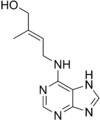Cytokinin facts for kids
Cytokinins are special natural chemicals, also called hormones, found in plants. Think of them like tiny messengers that help plants grow and develop! They can also be made by scientists in a lab.
These amazing hormones help plant cells divide and multiply quickly. This process is called mitosis. By speeding up cell division, cytokinins help plants grow bigger and stronger, faster. They play a big role in how plants grow from a tiny seed into a tall tree or a leafy bush.
Contents
What Are Cytokinins?
Cytokinins are a group of plant hormones that are mostly known for making plant cells divide. This is super important for growth! They were first discovered when scientists were trying to figure out how plant cells could be grown in a lab dish.
Where Do Plants Make Cytokinins?
Plants naturally produce cytokinins in certain parts, especially in the roots. From the roots, these hormones travel up to other parts of the plant, like the young leaves, stems, and developing fruits. This is because these are the areas where a lot of new cell growth is happening.
How Cytokinins Help Plants Grow
Cytokinins do many cool things for plants:
- Cell Division: Their main job is to encourage cells to divide. More cells mean more growth!
- Shoot and Bud Growth: They help new shoots and side branches (buds) to grow. This makes a plant bushy instead of just tall.
- Leaf Development: Cytokinins help leaves grow bigger and stay green for longer. They can even delay the aging process of leaves, keeping them fresh.
- Fruit and Seed Development: They are important for the proper growth of fruits and seeds, making sure they develop well.
- Overcoming Dormancy: Sometimes, seeds or buds are "asleep" (dormant). Cytokinins can help wake them up and start growing.
Types of Cytokinins
There are many different types of cytokinins. Some are found naturally in plants, and others are made by scientists.
Natural Cytokinins
One of the most famous natural cytokinins is zeatin. It was first found in corn (Zea mays), which is why it has "zea" in its name. Zeatin is very powerful and helps many plants grow.
Synthetic Cytokinins
Scientists have also created artificial cytokinins, like kinetin and benzyladenine. These are used in farming and plant science to help plants grow better, especially in plant tissue culture (growing plants from tiny pieces in a lab).
Cytokinins in Everyday Life
You might not see cytokinins directly, but they are very important in agriculture and gardening.
- Plant Tissue Culture: Scientists use cytokinins to grow whole plants from just a few cells. This is useful for making many copies of a special plant or for studying plant diseases.
- Improving Crops: Farmers sometimes use synthetic cytokinins to help crops grow faster, produce more fruits, or stay fresh longer after being harvested.
- Gardening: Some plant growth products for home gardeners might contain cytokinins to help plants root better or grow bushier.
Cytokinins are truly amazing chemicals that show how complex and clever plants are in managing their own growth and development!
Images for kids
See also
 In Spanish: Citoquinina para niños
In Spanish: Citoquinina para niños


